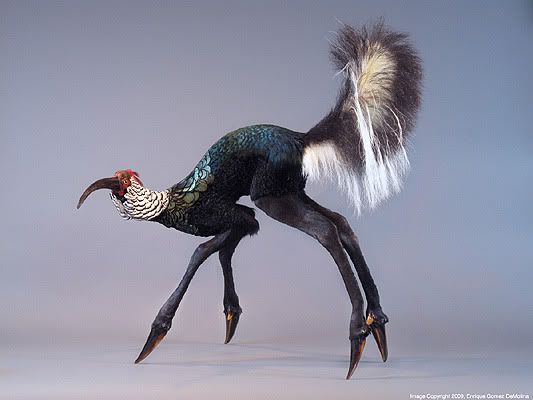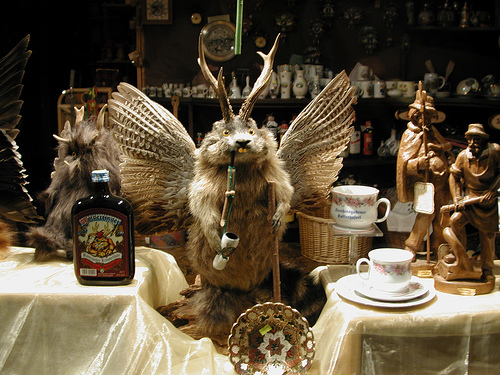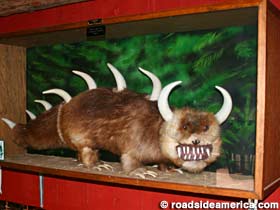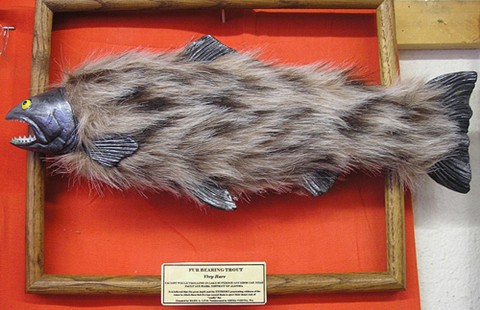Rogue Taxidermy is a folk-art form where you use dead animal parts to create some new, unique creature that never could have existed... but should have! So appropriate for Halloween.
The folk art form of rogue taxidermy seems to be rooted in the midwestern United States, and can be considered a hallmark of Midwest Gothic. The most famous group is the Minnesota Association of Rogue Taxidermists. One typical truckstop chimera is the jackalope:
Rogue taxidermists got so carried away with the jackalope thing that they managed to infuse the critter into the North American culture at large, and now no roadside truckstop is complete without a mounted jackalope head on the wall. There's jackalope tattoos and faux nature documentaries and hundreds of photo manipulations. Jackalopes are world famous, a triumph of rogue taxidermy! Future popularity to a similar degree may be won for the hodag:
Or the fur-bearing trout:
As you can imagine, there's a huge crossover between the rogue taxidermy and cryptozoology worlds. Whether through intentional attempts to hoax the public, or tongue-in-cheek attempts to hoax the hoaxers by going "Look, I found one!"
Thursday, October 24, 2013
Wednesday, October 23, 2013
Several resources about Quantum Entanglement
Since we now have our first experiment demonstrating that time is an emergent quantum phenomenon, it's about time we rounded up some info on this quantum entanglement idea and see if we can corner it.
The Wiki.
A friendly introduction to the fundamental problem we're trying to solve:
Here's Neil DeGrasse Tyson explaining it some more:
So what's the big deal? Putting it into the most basic possible terms: We've observed small particles in the universe that act like they're "talking to each other" and determining how to be, even after they're separated and shouldn't be able to affect each other. It's like we can slice a red apple in half, put each half in a box and send the two boxes to opposite sides of the world, then have somebody open one box and paint their half of the apple green, and then when somebody on the other side of the world opens the box with their half-apple in it, it's turned green too.
And we don't know how this works. We've been trying to find out since the time of Einstein. Einstein himself called this "a spooky action at a distance."
Not only are we observing the effect that two particles can have on each other, and not only is it instantaneous (defying everything we know about the speed of information alone), but it appears to even be possible to have the same thing happen when the entangled elements are separated not only by space, but time as well. So Israeli scientists have made photons affect each other even when they didn't coexist at the same time.
So either we're dead wrong about this, or we have a way to both time travel and teleport either information or physical actions instantly. It could be a flaw in our reasoning based on some fundamental shortcoming of human perception and reasoning.
A LiveScience infographic:
And finally, quantum entanglement has been simulated within the world of, of all things, Minecraft.
Are we nuts? Maybe. Maybe the universe is nuts, too.
The Wiki.
A friendly introduction to the fundamental problem we're trying to solve:
And we don't know how this works. We've been trying to find out since the time of Einstein. Einstein himself called this "a spooky action at a distance."
Not only are we observing the effect that two particles can have on each other, and not only is it instantaneous (defying everything we know about the speed of information alone), but it appears to even be possible to have the same thing happen when the entangled elements are separated not only by space, but time as well. So Israeli scientists have made photons affect each other even when they didn't coexist at the same time.
So either we're dead wrong about this, or we have a way to both time travel and teleport either information or physical actions instantly. It could be a flaw in our reasoning based on some fundamental shortcoming of human perception and reasoning.
A LiveScience infographic:
And finally, quantum entanglement has been simulated within the world of, of all things, Minecraft.








